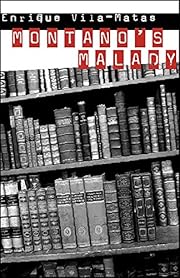

Click on a thumbnail to go to Google Books.
|
Loading... Montano's Malady (2002)by Enrique Vila-Matas
 None No current Talk conversations about this book. Names of writers thread through Montano's Malady, as they do through his Bartleby & Company and Dublinesque and lots of Bolaño but notably The Savage Detectives. A few are familiar, but very few, attesting to how, for the general reader, among whom I count myself, Spanish and Latin American fiction is very largely unknown. The stream of names seems memorial, casting a mournful light over these books, most poignantly Bolaño's, the sadness not only for the lost writers, but for their obscurity outside their own language. So that part will be a little familiar, which Vila-Matas readers will or will not like to feel. But in the foreground of this work are writers and publishers and their friends and family, most aging uncomfortably as they question if what they've been working for all their lives will last or is doomed. Montano's Malady employs a great deal of traveling in search of some answer to vexing questions about the condition of literature in our age, though we eventually understand much of the travel is literary, done in words and not in space, putting the characters in the same position as the reader. The narrator is often so oppressed by everything in his life and everything not in it that the excess seems satirical -- but not quite. The other two main characters are deftly and compellingly drawn in their repeated and changing literary incarnations: thus the book carries the reader along, perhaps as perplexed as the protagonist, but perhaps enjoying the erudite name-dropping at this deeply literary cocktail party. Vila- Matas speaks to me. He is one of my favorite writers who specializes with inventiveness. As in the earlier Bartleby & Company he writes about reading and writers; indeed Montano's Malady is a sickness in which the sufferer is exhausted by their never ending obsession with books. He has special affection for Sebald, Musil, Walser, Kafka and other experimentalists. If you have a touch of this malady you will find some relief in this novel. Enrique Villa-Matas cita um escritor argentino que acredita que o grande tema do diário íntimo no século XX é a doença. Ou ele apenas inventa a citação? Nunca se sabe com Villa-Matas. Um jogo literário, com personagens como Walser, Kafka, Musil, Pessoa, estimulante e interessante como Síndrome de Bartleby. Dividido em várias partes que se desconstroem. Amei o encontro com a viúva de Gombrowicz. no reviews | add a review
AwardsNotable Lists
The narrator of Montano's Malady is a writer named Jose who is so obsessed with literature that he finds it impossible to distinguish between real life and fictional reality. Part picaresque novel, part intimate diary, part memoir and philosophical musings, Enrique Vila-Matas has created a labyrinth in which writers as various as Cervantes, Sterne, Kafka, Musil, Bolaño, Coetzee, and Sebald cross endlessly surprising paths. Trying to piece together his life of loss and pain, Jose leads the reader on an unsettling journey from European cities such as Nantes, Barcelona, Lisbon, Prague and Budapest to the Azores and the Chilean port of Valparaiso. Exquisitely witty and erudite, it confirms the opinion of Bernardo Axtaga that Vila-Matas is "the most important living Spanish writer." No library descriptions found. |
Current DiscussionsNonePopular covers
 Google Books — Loading... Google Books — Loading...GenresMelvil Decimal System (DDC)863.64Literature Spanish, Portuguese, Galician literatures Spanish fiction 20th Century 1945-2000LC ClassificationRatingAverage: (3.85) (3.85)
Is this you?Become a LibraryThing Author. |
||||||||||||||||||||||||||||||||||||||||||||||||||||||||||||||||||||||||||||||||||||||||||||||||||||||||||||||||||||||||
Enrique Vila-Matas
Publicado: 2002 | 221 páginas
Novela Otros
Entre el diario íntimo y la novela, el viaje sentimental, la autoficción y el ensayo, este libro nos propone el triunfo de la literatura. Un narrador, que firma sus libros como Rosario Girondo, escribe un diario personal y lleva tan lejos su mal de Montano, está tan enfermo de literatura, que la ficción inicial (la creación de un personaje obsesionado por el porvenir de la literatura y dedicado a descifrar el arte de los diarios personales de sus escritores favoritos) acaba transformándose en una realidad cuando el autor se convierte en carne y hueso en la literatura misma, y entra a formar parte de una sociedad secreta de conjurados contra los enemigos de lo literario.